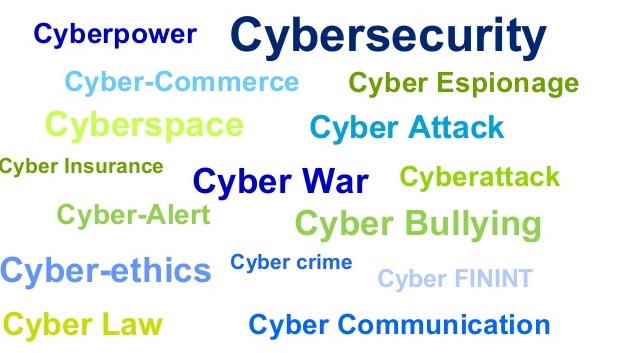It’s not exactly breaking news that the US government overuses the word ‘cyber’, often as a means for making something sound more official or threatening. What’s interesting in this instance is the over-extent to which the word is used in legislative publications.

A ‘hack’ is not simply a ‘hack’ — it’s a cybercrime. If another country is involved, it becomes ‘cyberwar’. And if a country on the defense puts up a firewall, it’s referred to as ‘cybersecurity’.
Bruce Sterling took a close look into the history of the word “cyber” in 2013, and was quoted in io9 stating his theory about the word’s (over)use:
I think I know why the military calls it “cyber”—it’s because the metaphor of defending a “battlespace” made of “cyberspace” makes it easier for certain contractors to get Pentagon grants. If you call “cyberspace” by the alternate paradigm of “networks, wires, tubes and cables” then the NSA has already owned that for fifty years and the armed services can’t get a word in.
Today, the word is overused to the point of creating confusion. For example, in a March 3rd briefing by county prosecutors to Apple, in which it was explained why the company should help unlock the iPhone used by one of the San Bernadino shooters, the term ‘cyber pathogen’ was referenced:
The iPhone is a county owned telephone that may have connected to the San Bernardino County computer network. The seized iPhone may contain evidence that can only be found on the seized phone that it was used as a weapon to introduce a lying dormant cyber pathogen that endangers San Bernardino’s infrastructure.
One may ask — what exactly is a cyber pathogen? And that would be worthwhile question — you see, a quick Google search yields limited results beyond its reference in this briefing, and certainly no documentation in any sort of formal computer science-related publication.
This prompted the curiosity of the folks at QZ.com who took it upon themselves to analyze every mention of the word ‘cyber’ on congressional record since 2000 (via Capitol Words by the Sunlight Foundation). The results are headache-inducing — there are at least 80 distinct uses of the word, all of which are listed below:
Phrase / Count
cyber security 268
cyber threat(s) 123
cyber attack(s) 87
cyber crime(s) 56
cyber defense(s) 30
cyber space 22
cyber command 20
cyber incident(s) 15
cyber network(s) 10
cyber bill 7
cyber communications 7
cyber infrastructure 6
cyber intelligence 6
cyber trespass 5
cyber criminals 4
cyber issue(s) 4
cyber privacy 4
cyber risk(s) 4
cyber emergencies 3
cyber espionage 3
cyber future 3
cyber intrusions 3
cyber matters 3
cyber organization 3
cyberpiracy 3
cyber scholarship 3
cybersquatting 3
cyber system(s) 3
cyber terrorism 3
cyber warfare 3
cyber actor 2
cyber breaches 2
cyber center(s) 2
cyber director 2
cyber education 2
cyber hygiene 2
cyber intent 2
cyber investigations 2
cyber investigative 2
cyber legislation 2
cyber monday 2
cyberpatriot 2
cyber theft 2
cyber week 2
cyber workforce 2
cyber academy 1
cyber action 1
cyber activities 1
cyber area 1
cyber attacked 1
cyber authorities 1
cyber bank 1
cyber behavior 1
cyber bullies 1
cyber cafes 1
cyber critical 1
cyber curriculum 1
cyber economic 1
cyber hacks 1
cyber information 1
cyber initiative 1
cyber insurance 1
cyber introverts 1
cyber means 1
cyber pearl 1
cyber penetrations 1
cyber policy 1
cyber predators 1
cyber service 1
cyber smuggling 1
cyberspies 1
cyber strategic 1
cyber support 1
cyber terrorists 1
cyber tip 1
cyber tipline 1
cyber training 1
cyber vulnerabilities 1
cyber war 1
cyber warrior 1
cyber youth 1
What do you think? Has the word ‘cyber’ become a crutch for politicians and government officials to lean on when not given enough time to truly understand the matter at hand?
Advertisement
Learn more about Electronic Products Magazine





